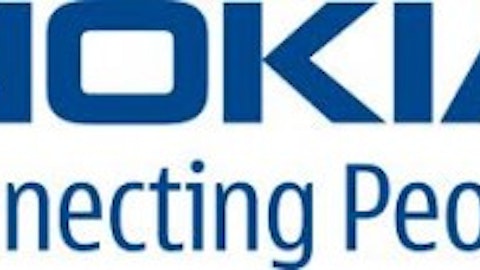Nokia Corporation (NYSE:NOK) is in the process of a major product revamping effort. Earlier this year, a number of investors were disappointed by the Finnish cell phone company’s decision not to adopt Google Inc (NASDAQ:GOOG)’s Android operating system, putting it into more direct competition with other Android phones. After its press conference on September 5, the market slashed Nokia shares by over 15 percent, likely due in part to the announcement that its two new smart phones will not be available until the fourth quarter in “select markets.”
In all, Nokia Corporation (NYSE:NOK) seems like an interesting value play, trading at a small fraction of its 52-week high and at about 0.93 times book. The company is also held by a few tech-savvy hedge funds, such as Philippe Laffont’s Coatue Management (view his portfolio here). Though the company does indeed possess a number of virtues, it faces a number of significant risks and has had trouble generating cash recently.
New Phones. The Lumia 920 and 820, in honesty, look very nice and have received a fair amount of praise among techies. They both run Windows Phone 8, which features a fully customizable and intuitive start screen that appears user-friendly. The company claims that screens on the phones have the fastest refresh rate of any phone on the market, and the PureView camera is loaded with features. Indeed, the camera could prove to be a major differentiating factor (daily cell phone photos taken have surpassed daily digital camera photos taken in 2012). The augmented reality functionality and native navigation system also represent major improvements on some of the most-often used smart phone features.
The Apple Risk. If Apple Inc. (NASDAQ:AAPL) announces an iPhone 5 with significant photo and navigation upgrades, Nokia will lose a massive amount of would-be customers. The major problem is that the phone is not available for immediate or even near-term release, similar to a move that Microsoft Corporation (NASDAQ:MSFT) made in releasing its Surface tablet. There is likely to be a large amount of indiscriminate buying of Apple iPhones after the release, assuming that the new version possesses even modest upgrades from the iPhone 4S. However, the holiday season will be the biggest test for the Lumia as shoppers choose among Android, iOS, and the new Windows Phone 8.
Remember the patents. One commentator reviewed the patent portfolio for Nokia, and there are a number of interesting features. Nokia Corporation (NYSE:NOK) holds about 18.9 percent of all the essential patents for 4G/LTE functionality, and 4G is still in its infancy in respect to the worldwide market. The company has a portfolio of patents with an average lifespan of 13.8 years—a positive given the fact that it presently receives about $615 million yearly to license them.
The estimated present value of the patent portfolio ranges between $3.1 billion and $6 billion, depending on the analyst. In the worst case scenario, the patent portfolio stands to be a significant store of cash. Another downside is that the company has filed relatively few recent patents when compared to its filing history over the past ten years. However, on a more positive note, Nokia’s mapping patents, which were essentially acquired with its $8 billion NAVTEQ purchase in the early 2000s, are finally being fully exploited in the new smartphones.
Dumb phones. Not all phones are smart phones, and it is easy to forget that most of the cell phone owners in the world do not yet possess a 3G device. The basic phone market is actually Nokia’s most important market. As we reported last month, Nokia’s $39 basic phones—the Asha line—have sold well in the United States but have, more importantly, made serious headway in the Chinese and Indian markets, where consumers spend less money on phones (which are often not subsidized by cell phone carriers). Nokia’s basic phones outsold its smartphones 7-to-1 in the second quarter.
Conclusion. Nokia Corporation (NYSE:NOK) is one of my speculative buys. Next to Samsung Electronics Co., Ltd. (KRX:005930), Nokia is the second largest manufacturer of cell phones in the world. Additionally, unlike PC companies that are suffering from the deadly “post-PC flu” (which I detail elsewhere), Nokia is in a market with excellent secular trends. There were more smartphones sold than PCs in 2011, the first year ever in which that was the case. That said, I would put this in my “lottery” bin, not my “investment” bin.
Disclosure: Brian owns shares in Nokia, Microsoft, and Apple.

